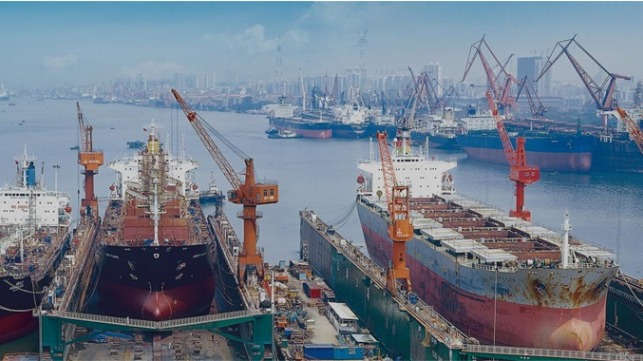China Takes Steps in Hydrogen Fuel Cell Development

China took a step forward in the race to develop commercial hydrogen technology for the shipping industry. The China Classification Society awarded China’s first certificate of type approval for a marine fuel cell product. CCS says that the approval marks a major milestone in China’s pursuit of commercially viable alternative fuels and provides a new channel for the use of hydrogen fuel cells on ships.
The certificate was issued to PEM fuel cell supplier Troowin Power System Technology Co. based in Wuhan, China. It was issued after more than a review and on-site tests and is part of the overall effort being led by CCS to research and develop hydrogen fuel cells. The project aligns with China’s goal to reach carbon neutrality before 2060. Currently, considered to be one of the largest sources of greenhouse gas emissions, China committed to the United Nations to ensure that its greenhouse gas emissions peak in the next decade.
“This certificate is the culmination of many years of work,” said Jia Siqing, General Manager of Industrial Products for the CCS Wuhan branch. He noted that CCS published its first guidelines on harnessing hydrogen as a commercial marine fuel in 2015 with the guidelines updated in 2017 and 2020. CCS is currently conducting research to develop the first domestic technical regulations for ships using hydrogen fuel, which it plans to release at the end of 2021.
In the next phase of its hydrogen development, CCS says it will undertake a series of tests on a purpose-built 2,100 dwt bulk carrier. The ship is currently at the design stage and is expected to be powered by four 130kW hydrogen fuel cells. Once completed, the ship will operate trials along the Pearl River in Guangdong province, where it will carry cargoes.
A major challenge CCS says it is looking to tackle during the tests is storing enough hydrogen to take a ship on a deep-sea voyage said Mr. Jia. CCS reports that it is researching ways to store hydrogen in large quantities and combine it with other fuel sources to extend the range.
“Since hydrogen is the lightest natural element, more space is needed to store it,” Jia said. “We are looking at methods to create hydrogen at sea, such as the use of methanol or ammonia, which can be transported easily and cheaply. But the main focus of our work is carrying enough bulk hydrogen, for an entire voyage. We think liquid hydrogen would be a good contender for this. In the meantime, high-pressure gas cylinders would be a reasonable solution.”
Luo Xiaofeng the Director of CSS Rules & Research Institute in Wuhan said a prime objective of the Pearl River tests would be to test safety procedures but that in the short-term, for deep-sea voyages, low-carbon and hybrid systems are better forms of propulsion. New ships will also permit the optimization of safety in the design as opposed to working to retrofit hydrogen systems to the existing fleet.

that matters most
Get the latest maritime news delivered to your inbox daily.
“CCS is working with other hydrogen-use sectors and universities to share the research notably the automotive industry,” said Luo. “Breakthroughs elsewhere can help the marine industry. Safety is key to developing a commercial case. These are the prime factors we will be testing on the Pearl River project.”
In addition to researching various forms of marine hydrogen fuel storage technology, CCS has also jointly carried out special research on the application of hydrogen fuel on ships with China State Shipbuilding Corporation. The research included risk assessment, ventilation, and fire-fighting. The studies evaluated the feasibility, reliability and safety of hydrogen-fueled ships and provided support for the development of technical regulations.
